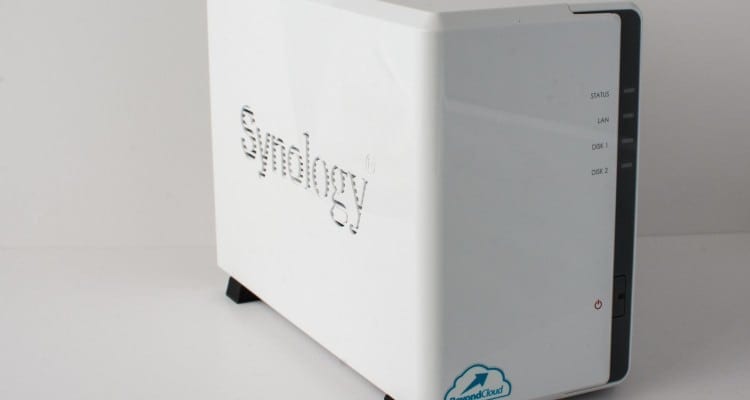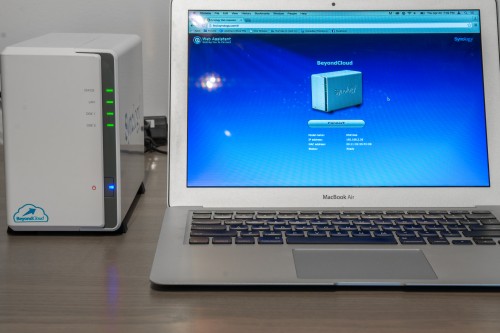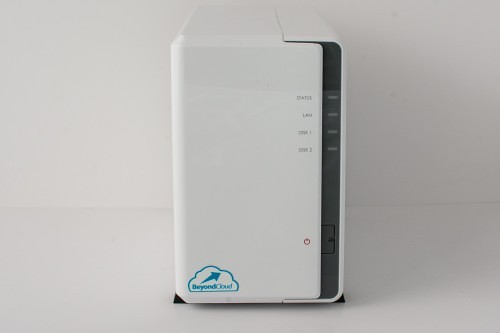- Ready to go out of the box
- No Mess Remote Access
- Multiple User Access (each with their own home directories)
- Can easily push CPU to maximum
- No USB3.0 support (for adding addtional drives)
In this day and age people are looking for storage solutions that their entire household can utilize. A personal cloud-storage solution that is easy to set-up and easy to access. Synology has an answer to that. Enter their BeyondCloud Network Attached Storage (NAS) product line. A plug and play, external storage solution that is easy to set-up, configure and runs within the Macintosh environment or really any computer environment right out of the box.
Features and Specifications
Synology offers three different models of their BeyondCloud product:
- BeyondCloud 2TB (BC115j 1200)
- BeyondCloud 3TB (BC115j 1300)
- BeyondCloud Mirror 3TB (BC214se 2300)
Synology BeyondCloud has features such as minimal setup, pre-installation of a Seagate NAS harddrive, pre-installed and configured operating system, USB backup, and in the case of the BeyondCloud Mirror, RAID protection for your data from single harddrive failure. You don’t need to worry about selecting the right NAS enclosure, the types of harddrives or any of those lower-level details that can make setting up a NAS a bit more difficult. Synology does it all for you and in an attractive white enclosure.
Synology has provided us with their BeyondCloud Mirror configuration which has 2x 3TB in a RAID1 (Mirrored) configuration. This is great in-case one of the drives ever fails since your data will be safe on the other one.
For those who are more into the technical specifications that are under this particular BeyondCloud’s hood, Synology has made use of the Marvell Armada 370CPU (ARM-7, 800MHz, Single Core with FPU) and 256MB of RAM. It might not seem like much to hardcore NAS builders, but it definitely gets the job done for those who don’t have time to source various NAS options out there.
What’s In The Box?
Synology has tried to make things as simple as possible with their BeyondCloud product. No need to source hard-drives or install any hardware, the BeyondCloud system comes installed and pre-configured out of the box. So inside the box, you get the NAS hardware itself (drive capacity varies on model), the AC power cable and an Ethernet cable. Everything you need to get yourself up and running within minutes.
I would recommend utilizing a Gigabit Ethernet (10/100/1000) network to get the most out of your NAS experience.
First Impressions
I have had an interest in storage solutions for some time now. Being an avid photographer with thousands upon thousands of digital images I’m always on the look out for new storage solutions. The easier they are to set-up, the quicker I can get back to capturing images.
Previously I’ve been making use of a WD MyCloud (2TB). The WD MyCloud allowed me to access some of my files remotely when needed. Though I’ve had some issues with it, some major issues with it actually. For starters, the WD server that handles the port forwarding access has been a big grievance of mine and has cost me in the long run as it keeps having issues finding the MyCloud on my home network. I can access my internal IP Security Cameras without issues, but WD tends to say my MyCloud is not online or my network is unreachable which is untrue if I can still access my internal IP cameras.
The lack of mobile apps or feature set of those apps across different devices has been an issue too with the WD MyCloud. One thing I’ve wanted to do is have an easy way to back up my wife’s iPhone photos. Something that would allow her to backup photos with out her really having to do anything. The Android version of the WD Photos app would auto-sync in the background whereas the iOS version would not. Tragic, I know but it is a deal breaker. It seems almost every month or so I have to plug her phone into a computer, off load her photos and videos and then erase them. I’ve read that I won’t have to do this with any of Synology’s NAS products.
For the operating system, Synology offers and their DiskStation Manager (DSM) OS. I was excited when I got my hands on the BeyondCloud. How does the BeyondCloud stack up against similar products already on the market? Well, let us take a look!



